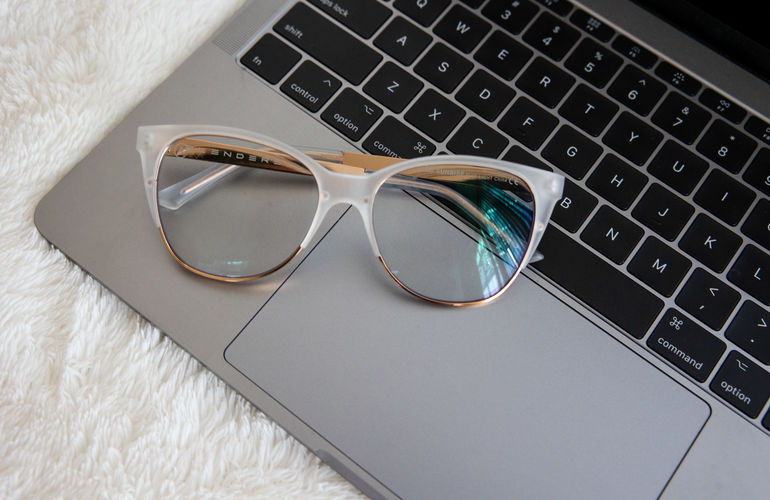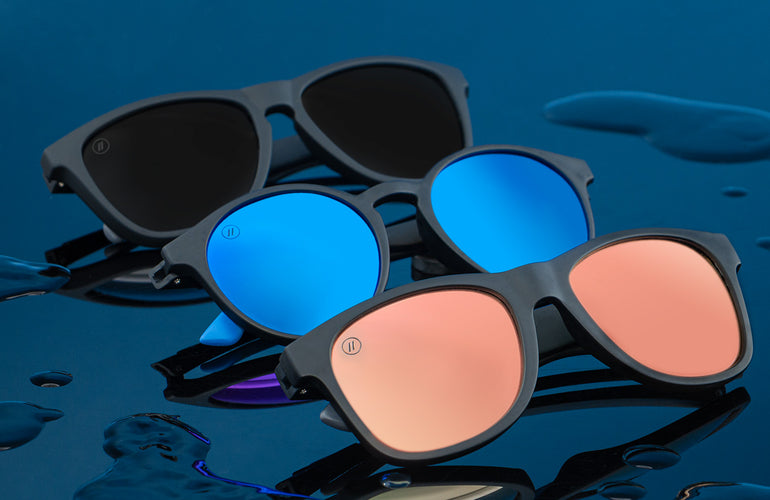Do your eyes feel more exhausted than you do after a long day at the office or working remotely? Following eight hours (or more) of staring at a computer screen, dry and tired eyes seem inevitable.
Digital screens emit blue light, which can have negative effects including eye strain and irritation along with dry or watery eyes. Blue light is also known to sabotage sleep schedules since it interferes with circadian rhythms (a.k.a., the internal clock that indicates when it’s time to sleep or be awake).
Yet most of us need to use computers, tablets and smartphones every day. So, how do we battle the negative consequences of digital screens? Enter: blue light-blocking glasses.
The Science Behind Blue Light-Blocking Glasses
When a device emits light, different colors vibrate at varying wavelengths. The blue-violet light is called high energy visible (HEV) light, which most closely resembles the sun’s potentially damaging blue light. Naturally, artificial blue light is much weaker than the sun’s blue light. Yet, the average American now spends so much of their time indoors in front of digital screens that the lower rate of exposure starts to add up.
Whether electronic blue light can directly cause eye problems remains unknown, but it may contribute. “The average time on devices and in front of screens for adults is pushing 11 hours per day. Our eyes are under a lot of digital light strain,” says Dr. Sheri Rowen, an ophthalmologist and member of the Eyesafe Vision Health Advisory Board. “The lenses are designed to help reduce digital eye strain and avoid circadian rhythm cycle disruption, affecting sleep and overall well-being.”
Benefits of Blue Light Glasses
Blue light glasses are often associated with two potential benefits: reduced eye strain and better sleep.
Blue light-blocking glasses guard against a percentage of this light with a special coating that reflects a portion of it away from the eyes. How high that percentage is depends on the individual glasses. Some blue light-blocking glasses have a yellow tint, while others look clear. Typically, yellow lenses filter more blue light than their clearer counterparts.

Are Blue Light Glasses Worth It?
Now, there are few different factors that lead to eye discomfort on the computer:
- Blue light
- Not blinking often (causing a dry and irritated cornea)
- When you are focused on something close up, such as a screen, our eyes are naturally strained and become contracted
Being that we live in a digital age, especially with most of us working remotely for time to come, treating yourself (and your eyes) to blue light glasses is definitely beneficial. We can’t give up our computers, so take any appropriate steps you can to nurture your eye health. We have multiple collections of blue light glasses, including gender neutral options, to help your search on finding the best pair for you:
A Series
Coastal
L Series
North Park
Starlet
In addition to blue light-blocking glasses, Optamologists also suggest trying these tips for screen time:
- Practice the 20-20-20 rule. Every 20 minutes, look at something 20 feet away for 20 seconds. This will help your eyes relax.
- Use eye drops throughout the day to help keep your eyes lubricated while you work at a computer.
-
Sit an arm’s length (about 25 inches) away from your screen. Most people sit too close to the computer and experience eye strain.
And since blue light has been shown to affect sleep, turn off all digital devices at least one hour before bedtime. Healthy eyes are happy eyes, after all!


















